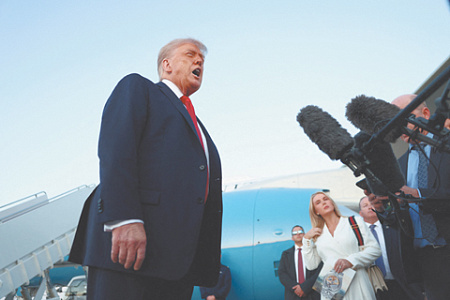
The European Union’s sanctions envoy, David O’Sullivan, is leading a delegation to Washington this week for high-stakes talks aimed at coordinating a new wave of sanctions against Russia. The visit, confirmed by the European Commission, seeks to align the EU’s strategy with the United States, marking the first potential joint sanctions effort under the Trump administration and signaling a renewed transatlantic push to increase economic pressure on Moscow.
The diplomatic initiative comes just after US President Donald Trump announced his readiness to initiate what he termed a “second phase” of sanctions. Trump clarified that he viewed the “first phase” as his administration’s effort to pressure India into halting its purchases of Russian oil by imposing tariffs on Indian goods, explicitly linking trade penalties to a country’s dealings with Russia and its ability to finance its war in Ukraine.
This strategy reflects a broader pattern in Trump’s foreign policy, where the threat of tariffs and restricted access to the vast US market is wielded as a powerful tool for political leverage. A case in point is Brazil, which faced a 50% tariff on its goods in what was widely seen as an attempt to influence domestic legal proceedings against his political ally, former President Jair Bolsonaro. This use of trade as a coercive instrument is reshaping international economic relations.
In response to what he condemned as blatant interference, Brazilian President Luiz Inácio Lula da Silva convened an emergency virtual meeting of the BRICS nations, which includes Russia, China, India, and South Africa. While the two-hour discussion concluded without a public statement, it signaled a growing desire among these major emerging economies to formulate a collective response to unilateral US economic pressure, a move that could mark a significant turning point for the bloc.
Should the US and EU talks prove successful, the resulting measures would constitute the 19th sanctions package from the European Union. According to reports, the European Commission is considering targeting banks in Central Asian countries suspected of helping Russia circumvent existing restrictions. This focus suggests that Western powers are now shifting towards closing loopholes and targeting evasion networks, as most major direct sanctions that can be imposed without significant self-harm are already in place.
Both Brussels and Washington appear to be playing a long game. Drawing on the experience of sanction regimes against nations like Iran and Venezuela, the strategic goal is not an immediate economic collapse but a gradual, long-term degradation of Russia’s economy. The ultimate aim is to erode its industrial base and defense capabilities, thereby diminishing Moscow’s capacity to sustain its conflict and project power on the global stage.
